On the 8th August, we took part in 24 Hours in Farming, the agricultural industry’s biggest online event, which highlights the pride of the nation’s food producers and encourages farmers to show the general public a typical working day through the power of social media using the hashtag #Farm24. Starting at 5am on Thursday 8th and finishing at 5am on Friday 9th, this 24 hour event encouraged British farmers to share an insight into their day to show consumers the effort and care that goes into producing their food.
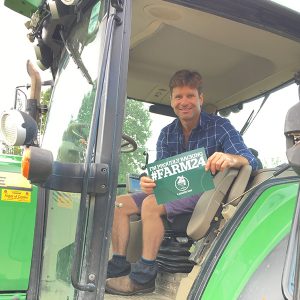
Duncan Farrington ready for #Farm24
Starting first thing in the morning, Duncan had to move all the barley in the barn back as far as possible, to give plenty of room for the barley he was due to the harvest throughout the day.
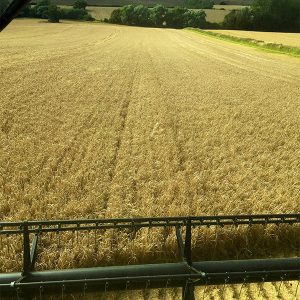
View from inside the combine harvester
Meanwhile, Robert (Duncan’s father) and Marvin (our farm worker) started preparing the combine harvester. This involved cleaning the windscreen, blowing the dust from the combine to reduce fire risk, setting up the GPS and getting the combine ready for a busy day. Once everything was set, Marvin starting combining. We use GPS to pinpoint our location in the field and steer the combine through the field, ensuring that each length of the field is harvested as efficiently as possible, reducing fuel usage and taking less time.
We were harvesting spring barley on this particular day. This year our spring barley was destined to be made into malt for beer, so a fairly important crop in our opinion!
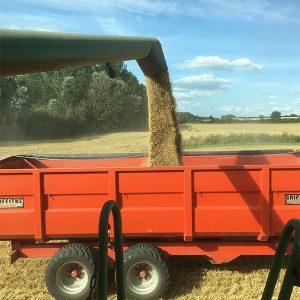
Barley being unloaded into the trailer
Whilst Marvin drove the combine, Duncan and Robert took it in turns to fill a trailer load of harvested barley from the combine and take it back to the farm yard and tip it into the barn. By having both Duncan and Robert do this, they were able to keep up with the speed Marvin was harvesting at so the combine didn’t have to stop at any point.
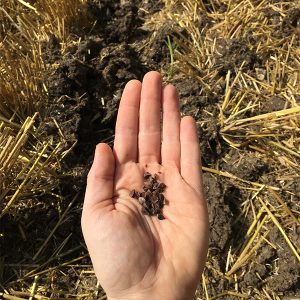
Cover crop seeds – buckwheat & phacelia
We visited another field on Bottom Farm, this one was harvested a few days previously and then planted with cover crops. We use cover crops to improve the health of our soil, but the key benefit is the fact that they absorb CO2 from the atmosphere and store the carbon in the soil (more info here). We planted buckwheat (the bigger, pyramid shaped seeds) which scavenge for phosphate and helps young plants’ root development. We also planted phacelia (the tiny seeds) which have fibrous roots for soil structure. On the same day as #Farm24, the UN also released their latest climate change report, which highlighted the importance of soil and storing carbon from the atmosphere in soil, which is exactly what our cover crops do!
Whilst Duncan was busy with harvest, his wife Eli jumped in a tractor and rolled the fields of cover crops. Rolling smooths the field and ensures the seeds are pushed into a good soil base to give them the best chance for growing.
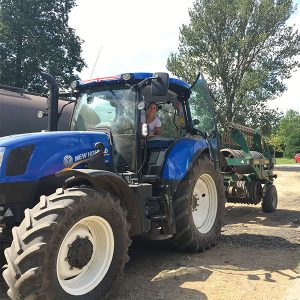
Eli Farrington in tractor
Next, we headed over to the Mellow Yellow production barn. Mellow Yellow Rapeseed Oil is grown, pressed and bottled on the farm. First of all, the seeds go into big yellow hoppers which feeds the seed into the presses. The seed is then cold pressed which involves being gently squeezed until the yellow oil is released. The seed husk is not wasted, it is shaped into pellets and sold to local farmers as high quality animal feed for cattle, pigs and sheep.
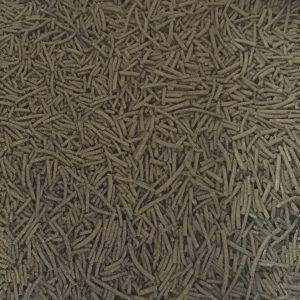
Rapemeal
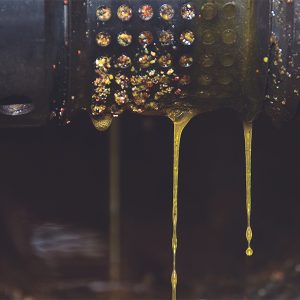
Rapeseed oil dripping from press
Once the seed has been pressed, the oil trickles out and is simply passed through a filter, a bit like coffee paper, before it is put into bottles. These bottles were then destined for Morrisons, the sponsors of 24 Hours in Farming, a lovely coincidence!
Returning back to the combine harvester, Duncan, Robert and Marvin had lots of barley to harvest, so ended up going until half 10 that night, it’s a good thing the combine has headlights! By the end of the day, we had managed to harvest all the barley, which we were VERY pleased with, especially as rain started to fall the minute after we had shut the combine into the barn, perfect timing or what! The weather often causes problems around harvest, the crops may be ready but if it’s raining, we can’t combine as the moisture levels must be low.
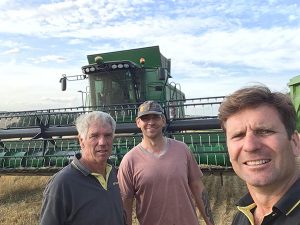
Duncan, Robert and Marvin after a busy day’s harvesting
Throughout the day, hundreds and thousands of British farmers and food producers shared images and videos from their day with #Farm24. It was a fantastic day for learning about how our food is produced. #Farm24 was trending for most of the day and over 8 million people saw the photos and videos shared throughout the day! For more information on 24 Hours in Farming, please visit Farmer’s Guardian here: https://www.fginsight.com/24hoursinfarming/sponsored—24hoursinfarming
Harvest finished in the second week of September, it was a rather drawn out event in the end, but on the whole went well. The new combine was the highlight of the year, a great machine that will hopefully be serving us well for the next decade. However, being a farmer, there is always something to worry about and this year it is the prices. The collapse in milk prices over the last year has been well published; but now it is hitting home with me of the 30% reduction in grain prices also, with no immediate prospect of a recovery on the horizon.
To take my mind off impending gloom on the current viability of British agriculture, I was delighted that our work in Farrington Oils has come to the attention of some influential people, like His Royal Highness.
A couple of weeks ago, I had a mysterious phone call to say we had been selected for a royal visit, to the home of Farrington’s Mellow Yellow “if you are interested?” Of course, we were interested, but the catch was it all had to be arranged within a few days. The timing was perfect for us as we have been investing in the business, hence we had something to talk about and see.
We hastily invited local councillors, colleagues, and customers to the event, with everyone being asked to keep it quiet. The drivers and armed police came out to check everything were up to scratch, with no security issues. Floors were scrubbed, equipment polished, whilst my mother and Eli made some Mellow Yellow inspired cakes and made sure we had enough cups and saucers to hand.
It also allowed us to exert some pressure on the local engineers to finish off the work in time for the occasion, it being finally finished the evening beforehand. We have installed more oil presses, increasing our capacity by two-thirds, along with two impressive oil storage tanks, increasing capacity by 400%. On the morning we busily gave the new equipment a final check-over before starting it working, nervously checking for leaks and issues, before getting changed into suit and tie.
His Royal Highness the Duke of Gloucester came to visit, spending time touring our factory and meeting the team. He bottled his own oil, before enjoying refreshments, chatting to our guests. It was a great event, I was very proud to show off our team at Farrington Oils. I was delighted to talk about our investment in equipment, a new staff position to look after national sales and our two latest export customers in the Middle East and Asia.
Following the visit, everyone was really pleased with a job well done, although exhausted. It is fantastic for company moral to be able to do something different and exciting occasionally; to invite customers and other guests to show them first hand what we do and, to be proud of our village and our county.
Over the years I have had bird surveys carried out on the farm. Primarily because I find this sort of thing interesting and whilst I am no bird expert (although I have learned a lot in the last few years), I do like to know what we have and what we can do to improve the likely hood of getting more species on the farm. Local conservation expert, Dr. Mark Avery has been surveying the birds at Bottom Farm since 2003. Back then he got very excited when he found Turtle Doves on the farm, which came back each year to nest. Unfortunately, in recent years he thought they had disappeared, which is the case in much of the UK. However, I was delighted recently when I thought I had spotted them here again, the turtle doves return. An excited call to Mark, who came out and confirmed, even more excitedly, that I was right! They’re back. This is great news, especially so as it was waste seeds I scatter around the farm from Farrington Oils, that they were feeding on.
Mark has just launched a new book, ‘A Message from Martha’, which talks about the sad demise of the last carrier pigeon in America, 100 years ago and the social history around the subject. It also draws parallels with the plight of the Turtle Dove today in the UK, mentioning our farm as part of the message. I haven’t read the copy kindly given to me yet, due to harvest keeping me busy at the moment, but am looking forward to soon. Until then it looks great on the coffee table, with the cover designed by local artist, Carry Akroyd.
Harvest is in full swing, with the rapeseed nearly gathered in, giving very pleasing results following a near perfect growing season. Marvin is taking over from Father as the main combine driver this year, for which he has some big boots to fill. After over forty years experience driving combine harvesters, there is not much my Father doesn’t know and to let a new man lose on our beloved machine can’t be easy, however, Father seems reasonably relaxed, showing Marvin the finer points to help make him into an experienced operator in time.
Once we have finished the rapeseed, there will be a few days catching up on other jobs around the farm in readiness for the main wheat harvest to start in August. This is when the real fun starts and it all gets a bit hectic, so preparation is key.
Farming Diary
From LEAF Demonstration Farmer Duncan Farrington

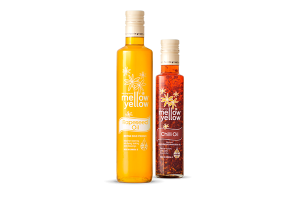 Oils
Oils Rapeseed Oil
Rapeseed Oil Chili Oil
Chili Oil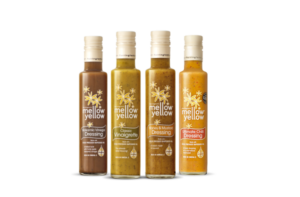 Dressings
Dressings Classic Vinaigrette
Classic Vinaigrette Balsamic Dressing
Balsamic Dressing Honey & Mustard
Honey & Mustard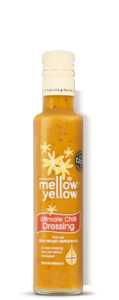 Ultimate Chilli Dressing
Ultimate Chilli Dressing